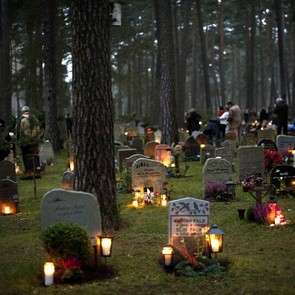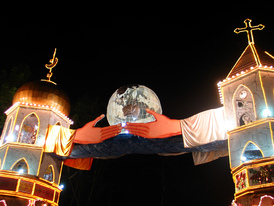
All religions have a deep intuition that death is not the end though what exactly that kind of life will be is a mystery. And most religions have a sense of growth and development after death so why not pray for the dead who are surely still connected to us through love. We know from science that all human beings are interconnected and this interconnection cannot end with death. Those who have gone before us are our spiritual ancestors and we are connected to them in a deep and profound way and we can call upon their strength and courage at any time. Michel Quoist once wrote a prayer in which he said ‘I am not alone, I can never be alone, I am a crowd Lord for people live within me. I have met them, they have come in, they have settled down’. If this is true for the people we have met in life it is even more true for all those who have gone before us, known and unknown. They are part of us and we are part of them.
The month begins with the feasts of All Souls and All Saints. I like the feast of All Saints because it recognises the holiness and sanctity of ordinary people, people whose goodness and holiness is hidden in their ordinariness and their commitment to their families, people whose struggles and heroism is known only to God. For me some of the most heroic and saintly people are parents of children with disabilities whose unconditional love is a life long commitment.
But of course there are also significant figures who offer us inspiration and courage, even if they've not been recognised officially as such. Some of these have been the Jesuits highlighted in the calendar of the British Jesuits this year. December's Jesuit is Walter Ciszek (1904-1984) who secretly entered Russia in 1940 (disguised as a Polish logger) but was quickly arrested and charged with espionage and tortured in Lubyanka Prison in Moscow. He then spent fifteen years in hard-labour in a number of Stalinist gulags, and survived a further eight years as a mechanic working under strict living and working conditions in Siberia. He was deported without any warning in 1963, part of a prisoner exchange for two Soviet agents and returned to New York where he taught in the Centre For Eastern Christian Studies at Fordham University.
And tonight on Scottish television there was a documentary about Jane Haining, a farner's daughter from Dumfrieshire who worked as a matron in a Church of Scotland school in Budapest in the 1940s which had a large number of Jewish boarders. Past pupils of the school spoke of Jane Haining's motherly concern for her pupils and how integrated the Jewish pupils were. Religious education was provided for them and apart from that it was impossible to know who was Jewsih and who Christian. All this changed with the Nazi invasion of Hungary and Jane cried as she sewed yellow stars on the Jewish children's clothes. She refused to leave her post in spite of many requests by the Church of Scotland to come home for safety. She was more concerned for the safety of her pupils. She was arrested by the Nazis and sent to hard labour in Aushwitz but died there after only two months. Today she is recognised at Yad Vashem as on of the Righteous Among the Nations.
People like Walter Ciszek and Jane Haining are surely saints. They are part of our human family and we have a deep connection to them. We can draw upon their courage and example. But this is also the case for 'ordinary' people, whose lives are unkown to the world at large but known to those who loved them. They heroically faced each day and coped with what life brought them as many saints in the making are doing day in and day out. I'm glad we take time out to remember them.





 RSS Feed
RSS Feed
